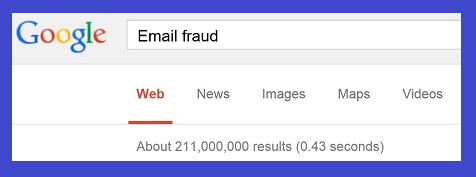Type in ‘email fraud’ into the pre-eminent search engine Google and then press enter. Recently on a laptop in UK Google returned ‘About 211,000,000’ results in 0.43 seconds. Two hundred and eleven million results in less than one minute. Internet users have come to expect rapid results and to rely upon and trust the information returned.
Fraudsters use similar sophisticated technology to scan millions of emails looking for an eight digit number and a six digit number containing two hyphens – a bank account. Once in receipt of this financial information the fraudsters are able to set up the email scam. Writing in Money for The Times Robin Ash reports on cyber fraud and the victims who have lost thousands of pounds as a result of an email scam aimed specifically property transactions.
Robin refers to a recent case where a couple received an email genuinely sent from their solicitor requesting details of their bank account in order that the solicitor could transfer the proceeds of their property sale to his clients on completion. Replying to the solicitors email the couple provided their bank account details. However, this email was intercepted and instead an email purporting to have been sent by the husband gave the fraudsters bank account information to the solicitor. In this instance the victims lost £62,000.00.
The response by law firms and property conveyancers is to revert back to paper correspondence or to use old technology and transmit bank account information using fax machines. Information sent by fax is transmitted over a telephone line as opposed to emails which are sent via the internet.
We take protecting your money seriously and have implemented a number of risk management strategies in order to manage this threat. These include:
- Our bank account-holding clients will be asked not to write down or tell others their passwords or PINs.
- We will not communicate with you by e-mail when providing or exchanging sensitive personal or financial information, documents and bank account details. We will correspond via letter and faxes
- At the outset of a conveyancing transaction, we will ask you to provide copies of bank statements for the destination accounts into which completion monies will be paid.
- Bank account details will be confirmed in person or on the telephone.
- If you ask us to change bank account details – we will treat this with caution.
- Be assured that all our IT and communication devices are properly protected with adequate security software, which is updated regularly.
We recognise that in some cases this may prove inconvenient for you, but the threat is very real with numerous cases each year of online fraud. We assure you we are following best practice with the above approach.
If you would like to know more about how we protect our clients’ money contact our residential and commercial conveyancing solicitors.
If you suspect you have received scam emails or you are a victim of internet crime you can contact Action Fraud the National Fraud and Cyber Crime Reporting Centre.



Leave a Reply
You must be logged in to post a comment.